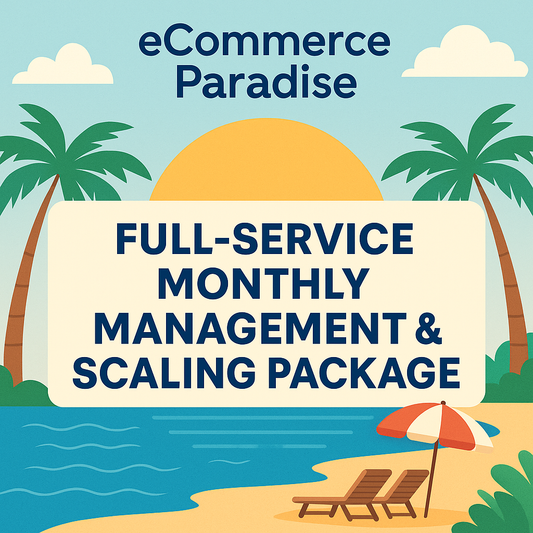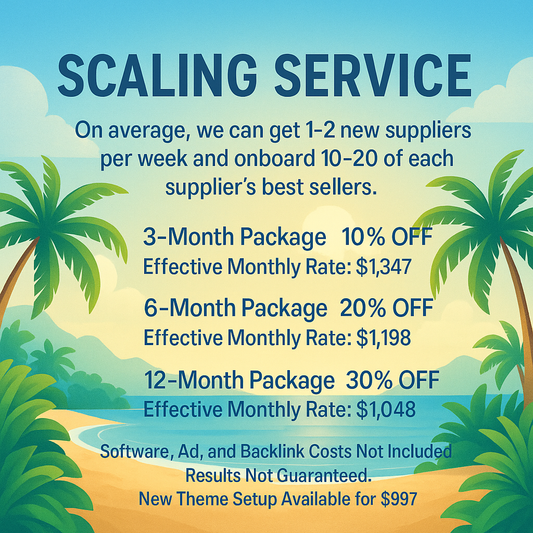
Legal Considerations for High-Ticket Dropshipping Success
Overview
TL;DR: Starting a high-ticket dropshipping business requires navigating various legal considerations, including choosing the right business structure (Sole Proprietorship, LLC, C-Corporation), obtaining necessary licenses and permits, understanding intellectual property rights, complying with data protection laws (GDPR, CCPA), managing contracts, handling taxes, and ensuring insurance coverage. Stay informed and consult legal advisors to ensure compliance and success in your venture.
Hi, everyone! Trevor Fenner here, founder of Ecommerce Paradise. If you're diving into the world of high-ticket dropshipping, you're not alone! Many entrepreneurs are discovering the exciting potential of this business model. However, as with any thriving venture, there are legal considerations that you must navigate to ensure your success isn't derailed. Let’s break this down into approachable, practical insights to help you run your high-ticket dropshipping store effectively without running into legal issues.
Understanding High-Ticket Dropshipping
First, let's clarify what high-ticket dropshipping actually means. Simply put, it involves selling products at a higher price point, usually above $200. Think luxury goods, high-end electronics, or premium home furniture. While the potential for profit is substantial, so are the legal responsibilities that come with managing such products and running an online business.
Choosing the Right Business Structure
One of the first legal considerations when setting up your high-ticket dropshipping store is selecting the appropriate business structure. Here are the most common options:
Sole Proprietorship
A sole proprietorship is the simplest and most straightforward option. As the sole owner, you have complete control over your business. However, be aware that this structure doesn’t provide personal liability protection. If your business incurs debts or faces a lawsuit, your personal assets may be at risk.
LLC (Limited Liability Company)
Many entrepreneurs opt to form an LLC, which provides personal liability protection while offering tax flexibility. It separates your personal assets from your business liabilities, making it a generally safer option for those running a high-ticket dropshipping store.
C-Corporation or S-Corporation
C-Corporations and S-Corporations provide a higher level of protection for your assets. They also have more stringent regulatory requirements and different tax implications, but if you’re aiming for significant growth or investments, they might be worth considering.
Licenses and Permits
Before you start selling, check what licenses and permits you may need. Different jurisdictions have various laws regarding e-commerce and dropshipping businesses, and compliance is crucial.
Business License
Most areas require a business license to operate legally. This often involves a small fee and some paperwork. Always verify with your local government to ensure you’re fully compliant.
Sales Tax Permit
If you're selling to customers in certain states, you may also need to collect sales tax. This requires you to obtain a sales tax permit from your state’s tax authority. Each state has its specific regulations, so be sure you understand where your product sales are taxable.
Intellectual Property Rights
When managing a high-ticket dropshipping store, understanding intellectual property rights is crucial. This includes trademarks, copyrights, and patents. Protecting and respecting these rights can save you from legal messes down the line.
Managing Trademarks
Be cautious when using brand names, logos, or any other trademarks that don’t belong to you. Using them without permission can lead to trademark infringement, resulting in legal penalties. Make sure to use images and content that you have the right to use or that falls under written permission.
Copyright Considerations
When showcasing product images or descriptions in your high-ticket dropshipping store, always ensure you have permission to use those materials. Using copyrighted content without authorization can lead to costly lawsuits.
Data Protection and Privacy Laws
As an e-commerce store owner, you're likely collecting customers' personal information, such as names, addresses, and credit card information. It’s imperative to handle this data responsibly to comply with privacy laws.
GDPR Compliance
If you're selling to customers in the EU, you must comply with the General Data Protection Regulation (GDPR). This legislation governs how personal data is collected, processed, and stored. Make sure your privacy policy reflects these commitments and that you obtain clear consent from users before collecting their data.
CCPA Compliance
If you're operating in California, you should also comply with the California Consumer Privacy Act (CCPA). This law gives consumers more control over the personal information that businesses collect about them. Ensure your high-ticket dropshipping store's privacy policy complies with these requirements.
Contracts and Agreements
As you navigate the legal waters, contracts and agreements are essential elements of running your high-ticket dropshipping store. They provide clarity of expectations and help mitigate disputes.
Supplier Agreements
Work with reliable suppliers and draft clear agreements that outline terms, responsibilities, and contingencies. This ensures everyone is on the same page and helps protect your interests.

Return Policies
Clearly outline your store's return policies. Since high-ticket items often come with higher shipping costs and potential customer reluctance, an easy-to-understand return policy can ease anxiety and drive sales.
Taxes and Financial Considerations
Taxes are an integral part of running your high-ticket dropshipping store. Here’s what to keep in mind:
Income Taxes
As a business owner, you’ll be responsible for income taxes on the profits your store generates. Make sure you keep detailed records of all transactions to ensure you’re prepared for tax season.
Sales Tax Collection
If your business is required to collect sales tax, ensure that you’re charging customers correctly based on their location. Many e-commerce platforms, including Shopify, offer sales tax calculation tools, so take advantage of those resources to simplify compliance.
Employment Laws
If you plan to hire employees for your high-ticket dropshipping store, you’ll need to familiarize yourself with employment laws. This includes matters related to wages, hours, workplace safety, and employee rights. Protecting your interests while respecting your employees’ rights is crucial.
Classifying Workers
Be sure to classify workers correctly, either as employees or independent contractors. Misclassification can result in hefty fines and penalties, so it’s essential to understand the legal distinctions.
Wage and Hour Laws
Stay informed about wage and hour laws that apply to your business. This includes minimum wage, overtime pay requirements, and record-keeping obligations.
Insurance Considerations
While we don’t typically think about insurance on a day-to-day basis, it's a critical component of safeguarding your high-ticket dropshipping store.
General Liability Insurance
General liability insurance protects you against claims of bodily injury or property damage that can arise when running your business. This coverage can save you from potentially crippling financial setbacks.
Product Liability Insurance
If you’re selling high-ticket items, having product liability insurance is crucial. This coverage protects you in case any product sold causes harm or injury to customers, and can be vital for ensuring your business remains safe.
Navigating International Sales
If you're considering selling internationally, there are several legal considerations to keep in mind. Each country has its own regulations regarding e-commerce, tariffs, and tax implications.
Customs Regulations
Understanding customs regulations is essential for international shipping. Different countries have varying policies regarding imports, and being aware of these rules can help you avoid potential delays or fines.
International Returns
Consider how you will handle returns for international customers. Many businesses neglect to define these processes, which can create confusion and dissatisfaction. Ensure your policies are straightforward and fair.
Staying Informed and Adaptable
The legal landscape is ever-changing, particularly in the realm of e-commerce. To maintain compliance and ensure the ongoing success of your high-ticket dropshipping store, it’s vital to stay informed about legal changes that may impact your business.
Maintain Regular Consultations with Legal Advisors
Regularly consult with a legal advisor who specializes in e-commerce or business law. This can help you stay ahead of the curve and address any potential issues before they escalate.
Invest in Continuous Learning
Be proactive in educating yourself about the laws and regulations governing e-commerce. There are numerous online resources, courses, and webinars available that can help you navigate these complexities.
Chart Your Course to Success
Running a high-ticket dropshipping store offers immense potential for profitability, but it also comes with its share of responsibilities. By understanding and addressing the legal considerations outlined in this article, you’re not just protecting your business, but also paving the way for lasting success. Keep these strategies close, and remember to seek qualified advice whenever you feel uncertain. You're on your way to building a thriving, legally-sound business, and I am excited to see what you’ll achieve! Your journey in done for you ecommerce can be rewarding and profitable—in both the financial and ethical aspects. So gear up, stay informed, and let’s make that high-ticket dropshipping dream a reality!
Linked Product

Done-For-You High-Ticket Dropshipping Store – Complete Build & Launch Service
The Done-For-You High-Ticket Dropshipping Store service allows entrepreneurs to bypass the complexities of building an online store by providing a comprehensive package that includes niche research, supplier sourcing, and a custom-designed Shopify setup. This service is particularly useful for those who want to enter the high-ticket dropshipping market without the usual learning curve, helping to ensure compliance with legal considerations from the start. With everything taken care of, users can focus on marketing and growing their business.
View Product

















